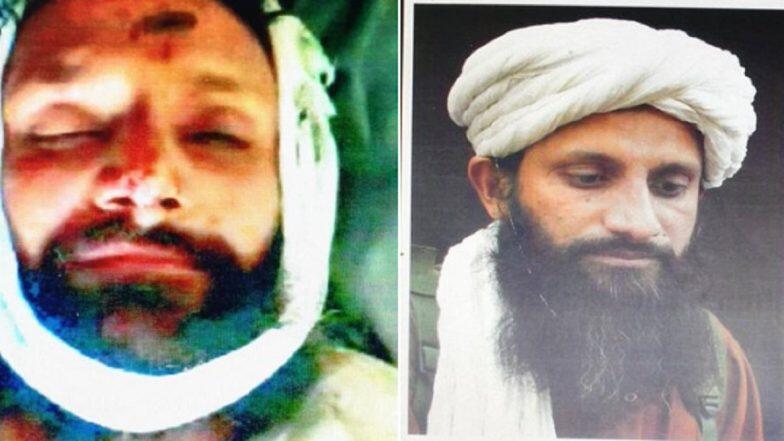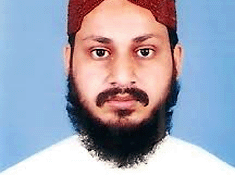Sharif govt powerless as banned terror group runs parallel courts in Pakistan

ISLAMABAD: (Asia Times): Jamaatul Daawa (JuD), a Pakistan-based militant organization active in India and Afghanistan, is running a parallel judicial system from its headquarters in Lahore. JuD’s self-appointed judges and their aides keep sending summons to citizens to dispense what it calls speedy justice among people in the light of Islamic laws.
A banned organization nationally and a terrorist organization internationally, the JuD is being led by Hafiz Mohammad Saeed designated by UN as the most wanted terrorist. It was Saeed who had founded the Lashkar-e-Toiba (LeT). The November 2008 terror attacks in Mumbai, which killed 165 innocent people, were blamed on the LeT which is considered to be the military wing of the JuD. Run by ‘qazis’ (judges), who are assisted by ‘khadmeens’ (court assistants), these courts (‘Darul Qaza’ or Shariah Court) mostly deal with civil cases involving property and monetary disputes. The complaints are addressed to Saeed who refers them to the qazis.
The JuD justifies the setting up of these courts by describing them as ‘arbitration panels’ where people come voluntarily for resolution of their disputes. But it remains silent on why these courts issue ‘summons’ backed by the threat of stringent action to the accused, although such action is the domain of the state. A Lahore-based property dealer, Khalid Saeed, who moved the Lahore High Court (LHC) against a summon issued to him by the self-styled Darul Qaza, was kidnapped by two bearded men on June 1, severely tortured and threatened for not appearing before the so-called court. The qazi (judge) of Darul Qaza had summoned him to its headquarters at Chauburji area in Lahore to defend himself against the allegations leveled in the complaint. Khalid had been summoned on the complaint of his former partner in a property business, alleging misuse of his investment.
But instead of obeying the order, Khalid approached the LHC, challenging the JuD court summons. “I was heading to the high court on my motorcycle on June 1 when two bearded men intercepted me. They took me to a nearby graveyard on gun point where they subjected me to severe torture and reprimanded me for not appearing before JuD court”, Khalid in a weak voice, lying on a hospital bed, with blood marks on his clothes. He had apparently underestimated the might of the JuD, for which he had to pay a heavy price, although the LHC had already ordered Punjab home secretary to look into the matter and decide it strictly in accordance with the law.
The kidnappers of Khalid had threatened him with dire consequences if he did not withdraw the case against the JuD court. Now he thinking whether to withdraw the case. JuD spokesman Yahya Mujahid defended the ‘Shariah Court’ saying it was not a “parallel judicial system” but an “arbitration court”, which decides disputes with the consent of the parties. He added that offering arbitration to confronting parties is not illegal. However, he could not justify issuance of summons carrying a “warning of strict action” in case of non-compliance.
The JuD is the first extremist group to have established a ‘Shariah Court’ in Punjab although many such courts operated by pro-Taliban extremist groups had been functioning in the Kyber Pakhtaunkhawa province. With the prime objective of establishing an Islamic state in South Asia and uniting all Muslim majority regions in countries that surround Pakistan, the LeT was launched by Saeed in the Kunar province of Afghanistan in 1989 with the backing of the state-run Inter-Services Intelligence (ISI). Two decades later, the Lashkar is considered to be one of the most effective jihadi groups operating in Jammu and Kashmir and involved in guerilla activities, largely due to its extraordinary growth in size, enormous resources as well as fame.
Interestingly, despite being declared a terrorist organisation by US State Department and placed on the terror watch list of the Pakistan government, the JuD has been enjoying considerable freedom in Pakistan to raise funds and recruit cadres. Its banners can be seen in urban and rural areas of Punjab urging young boys to enroll themselves with Jamaatul Daawa and Lashkar-e-Toiba for waging war against “infidels”. The banners usually carry the telephone numbers of the area offices so that they can contact local agents of the group. The prospects of free education, food and lodging they offer are a big attraction in rural Pakistani society where people live in extreme poverty. And the JuD leadership knows how to exploit the situation.
The LeT and the JuD activists can be seen outside mosques in the rural areas of Punjab, distributing pamphlets and periodicals preaching the virtues of jihad in the Indian Kashmir, Palestine, Chechnya, Kosovo and Eritrea and vowing to hoist the flag of Islam in Washington, Tel Aviv and New Delhi. Also the donation boxes of JuD which had disappeared soon after the 2008 Mumbai attacks and a subsequent government swoop against the group are back on public places as well as mosques across Pakistan. However, most of the funds still come in the form of anonymous donations being sent directly to JuD accounts from various parts of the world.
Western media reports say the JuD uses all these funds to run dozens of training camps for LeT militants along the LoC, being the front organisation of the LeT. In its 2008 annual report on global terrorism, the US State Department said that after being outlawed, the LeT and Saeed continued to spread ideology advocating terrorism, and virulent rhetoric condemning the United States, India, Israel, and other perceived enemies. The report noted that senior al-Qaeda commander Abu Zubaida was captured from a LeT safe house in Faisalabad on March 28, 2002.
“This suggested that some LeT members were facilitating the movement of al-Qaeda members in Pakistan”, the US State Department report had added. As things stand, it seems those jihadi elements that are not targeting the state of Pakistan, or had targeted the “enemy states” in the past, are still being given preferential treatment by the security establishment for obvious reasons. The release on bail of the prime accused in the Mumbai terror attacks, the LeT’s chief operational commander, Zakiur Rehman Lakhvi, and the unbridled freedom enjoyed by Saeed to pursue his extremist jihadi agenda indicate that the country’s counter-terrorism reaction following the Peshawar school carnage is still limited to domestic terrorism.
Jihadis, who are active in the neighboring states, will continue to be treated as ‘good’ Taliban. As a result, the organizational network of the JuD continues to survive and thrive across Pakistan. Most terrorism experts in Pakistan believe that the LeT has proven to be a success story thanks to the support by the country’s establishment which uses the group to advance its so-called geo-strategic agenda in the region. Since its inception, the group has managed to attract thousands of committed young men into its fold. LeT uses its impressive organizational network which includes schools, social service groups and religious publications to create a passion for jihad among youth.
Hafiz Saeed is more amenable to the ISI than leaders of other jihadi outfits as he would readily agree to wage a “controlled jihad” in Kashmir whenever he is asked to do. Similarly, LeT is perceived to be more dedicated to the cause of Kashmir’s liberation and hence more useful as it has the largest Pakistani component compared with other jihadi cadres. As the Muridke headquarters of the JuD became the focus of media attention in the aftermath of the Mumbai terror attacks, JuD leadership shifted its base to Jamia Qadissiya Mosque in Lahore near Chauburji area which is also being used to run the parallel judicial system in the form of Darul Qaza.
The intensity of the JuD’s growing unlawful activities were highlighted by the English newspaper, The Nation in its June 2 editorial titled “JuD’s Violent Extremism.” “The illegal activities of JuD keep piling up and the government keeps ignoring them, perhaps in sympathy to their cause, perhaps out of fear. The ruling PML-N led by Prime Minister Nawaz Sharif had promised it would never bow its head to religious extremism after the Army Public School attack in Peshawar, yet here is extremism running amok in their stronghold, and they stand powerless.
“As for the real court – the mighty third pillar of the state – it is time for them to establish their authority and hand down harsh sentences to the JuD goons. No one will believe in the legitimacy of the judiciary if there are a group of uneducated clerics defying its authority a few kilometers away from the Lahore High Court. Just as no one will believe Punjab Chief Minister Shahbaz Sharif’s overzealous speeches and punching of tables if he shies away from the real fight.”
Interestingly, three dozen Punjab police commandos are providing security to Saeed under the instruction of Shahbaz Sharif after the US offered a reward of $10 million in April 2012 to anyone giving information leading to Saeed’s arrest. Instead of keeping a low profile, Saeed, during a conference in Rawalpindi on April 4, 2012, dared the US to carry out a military raid against him like the one that killed Osama bin Laden. “I am not hiding in caves and mountains. I am very much here in Rawalpindi. The Americans seriously lack information. Don’t they know where I go, where I live and what I do,” he asked. He had simply shrugged off the American action against him, stating: “Catch me if you can”.
Amir Mir is a senior Pakistani journalist known for his research work on Islamic militancy and terrorism in Pakistan. He has authored several books including “Talibanization of Pakistan: From 9/11 to 26/11,” “The Bhutto Murder Trail: From Waziristan to GHQ,” “The True Face of Jehadis” and “The Fluttering Flag of Jehad.”
(Copyright 2016 Asia Times Holdings Limited, a duly registered Hong Kong company. All rights reserved.)




